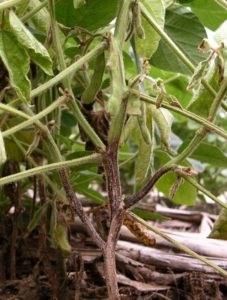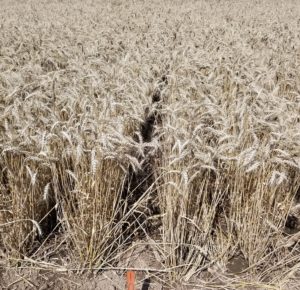Research - Overview
The Telenko Lab conducts research on the biology and management of major diseases of corn, soybean and wheat. Field research trials explore a variety of approaches to manage the many diseases of corn, soybean, and wheat. These trials are designed to address the needs of Indiana field crop producers, as identified in Dr. Telenko's Extension Program.
Dr. Telenko is responsible for developing and executing an Extension program that educates agribusiness clientele on the importance of effective and economical disease management for agronomic crops. Over 20 diseases of corn, soybean, and wheat may affect crops in a single growing season. This significantly impacts the health of these commodities and can result in losses of profitability making disease identification and management a primary concern.
The primary focus of the extension program is recognizing and understanding new diseases and their potential impact on Indiana agriculture, and quickly and effectively distributing information in the event of a disease threat to Indiana crop production.



 Frogeye leaf spot resistance to QoI fungicides was first reported in 2010 in Tennessee (Zhang et al., 2012) and has since been confirmed in samples from 14 states including Indiana (Zhang et al., 2018). Positive samples were collected from Clark, Delaware, Fountain, and Pulaski Counties in Indiana. This research suggests QoI resistance is widespread in Indiana, but this needs to be further confirmed and mapped across Indiana. It is important to determine the distribution of resistance in Indiana in order to prescribe proper management options for farmers.
Frogeye leaf spot resistance to QoI fungicides was first reported in 2010 in Tennessee (Zhang et al., 2012) and has since been confirmed in samples from 14 states including Indiana (Zhang et al., 2018). Positive samples were collected from Clark, Delaware, Fountain, and Pulaski Counties in Indiana. This research suggests QoI resistance is widespread in Indiana, but this needs to be further confirmed and mapped across Indiana. It is important to determine the distribution of resistance in Indiana in order to prescribe proper management options for farmers. White mold in soybean is caused by the pathogen S. sclerotiorum. Control of S. sclerotiorum is challenging as the pathogen produces specialized survival structures called sclerotia which can overwinter in the soil. Current management practices include crop rotation, plant populations, row spacing, and the application of synthetic fungicides at beginning reproductive stages. The most common disease management strategy is applying synthetic fungicides. However, the repeated use of synthetic fungicides has the potential to select for fungicide resistance. One alternative to synthetic fungicides is biofungicides.
White mold in soybean is caused by the pathogen S. sclerotiorum. Control of S. sclerotiorum is challenging as the pathogen produces specialized survival structures called sclerotia which can overwinter in the soil. Current management practices include crop rotation, plant populations, row spacing, and the application of synthetic fungicides at beginning reproductive stages. The most common disease management strategy is applying synthetic fungicides. However, the repeated use of synthetic fungicides has the potential to select for fungicide resistance. One alternative to synthetic fungicides is biofungicides.

 The project titled "Identifying and Expanding Integrated Disease Management Resources to include Organic Grains in Support of Organic and Transitional North Central Farms" aims to increase the success of organic grain farms in the North Central Region.
The project titled "Identifying and Expanding Integrated Disease Management Resources to include Organic Grains in Support of Organic and Transitional North Central Farms" aims to increase the success of organic grain farms in the North Central Region.